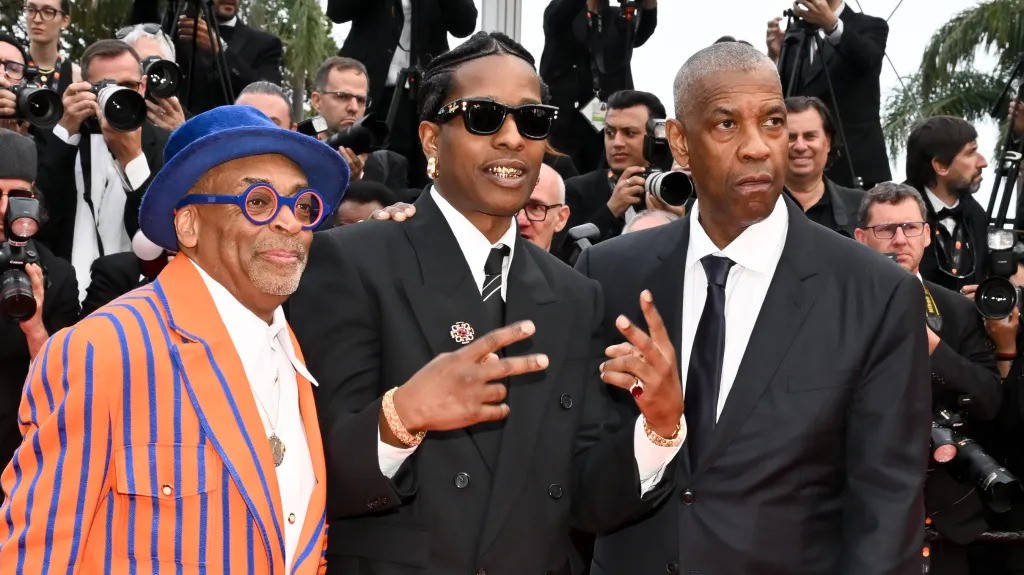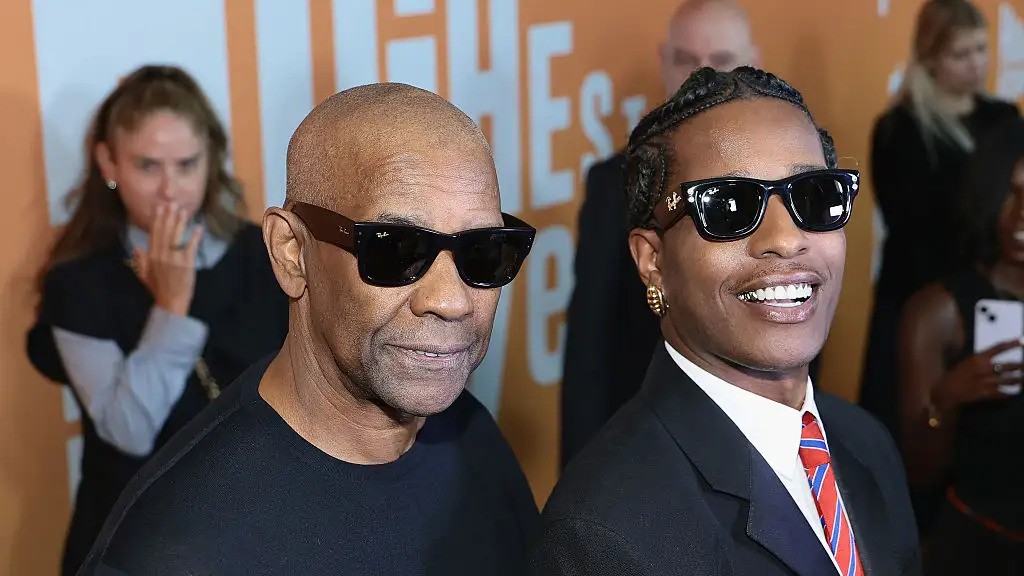Denzel Washington has always been known for his ability to command the screen, to take control of any role and bring it to life in a way that makes audiences sit forward in their seats. Over the years, he’s given us cops, lawyers, fathers, revolutionaries, and gangsters, each with the same mix of authority, intensity, and humanity that has made him one of the most respected actors of his generation. But in Spike Lee’s latest film, Highest 2 Lowest, Washington showed the world another side of himself that most people never imagined he had. For a brief moment in this thriller, Washington put down the gravitas and picked up a mic, surprising everyone, including his co-star A$AP Rocky, with a rap battle that wasn’t even in the script.
This moment has already become one of the most talked-about aspects of the film, because it wasn’t just Washington reciting a few lines for fun—it was him diving headfirst into the rhythm and the energy of hip-hop culture, holding his own against a real rapper, and proving that his creative instincts are sharper than ever. For Spike Lee, who has worked with Washington five times over the years, it was another reminder of why he keeps going back to the actor. You never know what he’s going to bring, but whatever it is, it’s going to make the scene unforgettable.
The story of Highest 2 Lowest is gripping on its own. A reimagining of Akira Kurosawa’s 1963 crime drama High and Low, it shifts the focus into the heart of the Bronx and reworks the tale into a modern thriller about music, money, and family. Washington plays David King, a once-powerful music mogul who built Stackin’ Hits Records into a major label but is now facing the harsh reality that his empire is crumbling. The hits aren’t stacking anymore, and he’s forced to consider merging with another company just to survive. Just as he’s trying to get his financial house in order, he receives a devastating call. His son Trey has been kidnapped, and the kidnappers are demanding a ransom of $17.5 million. But in a twist, it turns out they’ve taken the wrong boy. Instead of Trey, they’ve grabbed Kyle, the son of King’s longtime associate Paul, played by Jeffrey Wright.
That mistake sets off a tense race against time as King and Paul work with the police to save Kyle and figure out who is behind the scheme. The man orchestrating it all is Yung Felon, a young rapper fresh out of prison, played by A$AP Rocky. Felon is clever, ruthless, and always a step ahead, managing to escape with the ransom and leading King into a cat-and-mouse chase through the streets of the Bronx. The tension between the older mogul and the hungry young rapper creates the central conflict of the film, and it’s here that Washington’s unexpected freestyle moment takes place.
Spike Lee has admitted that the rap battle was never supposed to happen. They were setting up to film the scene where King confronts Felon in a recording studio, when Washington suddenly broke into bars from Nas’ Illmatic album, putting his own spin on the iconic track “Represent.” “I used to sport Bally’s in Cazals with black frames, now I’m into new chicks, texts and Beck’s,” he spit, throwing everyone on set for a loop. Rocky, taken off guard, didn’t back down. Instead, he responded with lines of his own, tapping into his character’s voice: “I gotta feed the streets, my lady and a newborn kid, and I ain’t tryin’ to go back and do another bid, you dig?”
What could have been an awkward break in filming turned into cinematic lightning. Washington and Rocky locked eyes, exchanging verses as if the studio had turned into a rap battleground, each feeding off the other’s energy. Lee says that in that moment, the film took off in ways he couldn’t have planned. “When Denzel started going to his battle rapper mode, Rocky was there right with him,” Lee explained. “That’s Denzel’s genius. When you have actors who elevate the scene at the same time, they’re elevating the whole movie. It became a heavyweight fight, like a classic ‘High Noon’ showdown.”

The rap battle works not just as entertainment, but as a metaphor for what the film is really about. It’s the clash between generations, between the old guard who built their empires through experience and endurance, and the young hustlers who are hungry for recognition and willing to risk everything to get it. Washington’s King represents wisdom and legacy, while Rocky’s Felon embodies ambition and raw energy. The battle of words becomes a symbolic passing of the torch—or, in King’s case, a refusal to let go of the mic without a fight.
The dynamic between King and Felon deepens as the story unfolds. King realizes that Felon has been closer to his son than he knew, discovering that the voice on the kidnapper’s call matches a track on Trey’s playlist. Following the trail through the streets, King and Paul track Felon down to a hidden studio. When they finally come face to face, Felon admits that he always admired King, that he grew up looking to him as a role model in the music industry. But admiration quickly turns to confrontation when Felon reveals he also resents how men like King sit at the top while younger artists struggle to break through. That’s when Washington, improvising in character, challenged him not just with threats, but with words, rhymes, and rhythm.
What makes this scene so powerful is that it wasn’t manufactured. Washington brought it from somewhere real, tapping into the cadence and confidence of hip-hop in a way that felt authentic. For Rocky, a rapper who built his career in studios and cyphers, it was an unexpected thrill to spar with a legend on new ground. The chemistry between them was electric, blurring the lines between scripted performance and spontaneous artistry.
But as much as the rap battle has grabbed headlines, it’s only one part of the larger story Lee is telling. Highest 2 Lowest isn’t just about kidnappings and gang rivalries; it’s about what happens when the world changes faster than you can keep up, and how men of different generations respond to that pressure. King is a man trying to hold on to relevance, trying to preserve his legacy in an industry that chews people up and spits them out. Felon is a young man trying to carve his name into that same industry, even if it means burning bridges or breaking laws. Their clash is inevitable, and Lee uses it to explore themes of power, survival, and the price of ambition.
The climax of the film takes the story back to the streets of New York, where King chases Felon down on the 4 train, subduing him in a fight that leaves Felon in police custody. From there, the narrative moves into its sobering finale. Felon becomes an unlikely star, his music blowing up online while he serves a 25-year prison sentence. In an era where controversy and notoriety often fuel fame, Felon’s incarceration only boosts his profile. He still wants King to sign him, to turn that notoriety into money, but King refuses. Instead, he turns away from the flashy world of big labels and launches a smaller, family-run operation, making it clear that his priorities have shifted. For King, it’s no longer about chasing every dollar—it’s about building something lasting, something meaningful.
Spike Lee himself has described the ending as a reflection of the wisdom that comes with age. “The old bloods, they live the life,” he said. “They’re talking from wisdom and knowledge, while the young don’t know anything yet.” In other words, King’s rejection of Felon is not just about business—it’s a statement about values, about what really matters when the spotlight fades.
Washington’s performance has been widely praised, not only for the gravitas he brings to King, but for his willingness to break out of his comfort zone and surprise audiences. The rap battle moment, in particular, has sparked conversations about how versatile he truly is, and how he continues to find new ways to reinvent himself even after decades in the business. For A$AP Rocky, it was also a moment to prove that he can hold his own not just as a musician, but as an actor capable of going toe-to-toe with one of Hollywood’s giants. Their chemistry turned what could have been a standard hero-villain dynamic into something layered and compelling.

What makes the story of Highest 2 Lowest resonate so strongly is that it feels both timely and timeless. It speaks to the struggles of holding onto power in a world that keeps changing, the temptation of quick fame versus the responsibility of building something sustainable, and the way art—whether it’s film, music, or even an improvised rap battle—can capture truths that dialogue alone cannot. Washington may not be launching a rap career anytime soon, but in that moment on set, when he decided to throw down verses and push Rocky into a lyrical duel, he reminded everyone why he’s still at the top of his game. He’s fearless, he’s inventive, and he’s always willing to take risks that other actors wouldn’t dare.
Spike Lee has built a career on capturing the rhythms of New York, the pulse of its neighborhoods, and the voices of its people. With Highest 2 Lowest, he’s brought that energy into a thriller that blends crime, music, and generational conflict, anchored by two performers who gave him more than he could have ever scripted. The rap battle may have been unexpected, but in hindsight, it feels inevitable. Put Denzel Washington in a room with a mic, and you’re going to get fire. Put him across from A$AP Rocky, and you’re going to get sparks. Put it all in the hands of Spike Lee, and you’re going to get a film that people can’t stop talking about.
At this point in his career, Washington doesn’t need to prove anything. His legacy is secure, his reputation untouchable. And yet, by surprising audiences with a rap battle in the middle of a thriller, he proved something anyway: that great actors never stop exploring, never stop taking risks, and never stop finding new ways to connect with audiences. He may not be dropping albums anytime soon, but as Spike Lee put it, when Denzel steps into battle rapper mode, you better be ready. Because if there’s one lesson from Highest 2 Lowest, it’s this—don’t get into a rap battle with Denzel Washington, unless you’re ready to be humbled.
